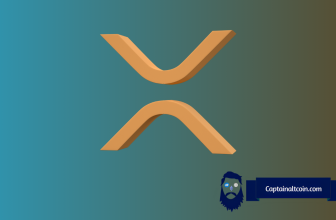
The tokenization of money funds is becoming a major trend as financial institutions look for faster, cheaper, and more efficient blockchain solutions. While Ethereum (ETH) has been the leading network for tokenized assets, growing concerns over high transaction fees and network congestion have pushed investors to explore alternatives.
Two promising contenders in this space are Hedera (HBAR) and Coldware (COLD)—both offering scalable and cost-effective solutions for tokenized financial assets.

Coldware (COLD): A Next-Generation Blockchain for Tokenized Assets
While Hedera (HBAR) focuses on enterprise adoption, Coldware (COLD) is revolutionizing blockchain finance with IoT-driven automation. Coldware integrates real-world asset tokenization with smart contract automation, offering unique advantages for financial institutions and businesses. One of the key features of Coldware is its multi-layered staking security, which ensures enhanced decentralization and risk management, making it ideal for institutions handling large sums of tokenized assets.
Coldware (COLD) also combines IoT and blockchain capabilities, allowing businesses to automate payments, logistics, and financial transactions in real-time. Unlike Ethereum, which primarily serves digital assets, Coldware’s IoT capabilities enable real-world integration and automation. Moreover, Coldware (COLD)’s lightweight architecture supports high-speed transactions with minimal fees, giving it a competitive edge in decentralized finance (DeFi), tokenization, and supply chain finance.

Why Ethereum (ETH) Faces Challenges in Tokenized Money Funds
Ethereum has long been the dominant platform for smart contracts, decentralized finance (DeFi), and tokenization. However, as institutional adoption of blockchain technology increases, several of Ethereum’s limitations are becoming more evident. High transaction fees, which can fluctuate unpredictably, make large-scale tokenization expensive, particularly for financial institutions.
Additionally, network congestion leads to slower processing times, further reducing efficiency. Ethereum’s scalability issues also make it difficult to handle high-frequency financial transactions, which are increasingly in demand as the financial sector turns to blockchain solutions. As a result, institutions are increasingly exploring alternatives like Hedera (HBAR) and Coldware (COLD) for managing tokenized money funds.
Hedera (HBAR): A Scalable and Enterprise-Ready Blockchain
Hedera (HBAR) has been gaining institutional support as a secure and highly scalable blockchain for financial transactions. Its unique Hashgraph consensus mechanism allows it to process over 10,000 transactions per second (TPS), a significant improvement over Ethereum’s current limitations. Hedera’s predictable, low-cost transaction fees make it highly attractive for financial institutions that require consistency and affordability.
Its enterprise-grade security ensures that the platform complies with regulatory requirements, a crucial factor for banks, asset managers, and large-scale financial platforms. Major corporations like Boeing, IBM, and Google have already partnered with Hedera, showcasing its potential for widespread enterprise adoption. As more financial institutions explore blockchain-based solutions, Hedera (HBAR) is emerging as a strong alternative to Ethereum in the tokenization sector.
Will Institutions Move Away from Ethereum (ETH) in 2025?
As Ethereum continues to struggle with scaling issues, institutions are increasingly testing Hedera (HBAR) and Coldware (COLD) as alternatives. Hedera (HBAR) is already securing enterprise adoption, providing fast, low-cost, and regulatory-friendly solutions for banks and asset managers. Coldware (COLD) introduces IoT-based automation, enabling instant settlements and real-world integration for financial transactions. Both Hedera and Coldware offer scalable alternatives to Ethereum, making them attractive options for institutions involved in tokenized financial assets and large-scale transactions.

Final Thoughts: Will HBAR & COLD Challenge Ethereum’s Dominance?
While Ethereum remains the largest blockchain for tokenized assets, the rise of Hedera (HBAR) and Coldware (COLD) could potentially reshape the industry. Hedera (HBAR) is quickly becoming the go-to blockchain for enterprise adoption, offering secure, high-speed financial transactions at low costs. Coldware (COLD) leads the way in IoT-driven tokenization, creating automated financial ecosystems that can outperform Ethereum’s traditional smart contracts. As institutions demand more efficient blockchain networks, Hedera (HBAR) and Coldware (COLD) are set to challenge Ethereum’s dominance in 2025. Investors and enterprises seeking scalable, cost-effective solutions for tokenized financial assets are likely to explore these emerging networks as alternatives to Ethereum.
For more information on the Coldware (COLD) Presale:
Visit Coldware (COLD)
Join and become a community member:
DISCLAIMER: CAPTAINALTCOIN DOES NOT ENDORSE INVESTING IN ANY PROJECT MENTIONED IN SPONSORED ARTICLES. EXERCISE CAUTION AND DO THOROUGH RESEARCH BEFORE INVESTING YOUR MONEY. CaptainAltcoin takes no responsibility for its accuracy or quality. This content was not written by CaptainAltcoin’s team. We strongly advise readers to do their own thorough research before interacting with any featured companies. The information provided is not financial or legal advice. Neither CaptainAltcoin nor any third party recommends buying or selling any financial products. Investing in crypto assets is high-risk; consider the potential for loss. Any investment decisions made based on this content are at the sole risk of the readCaptainAltcoin is not liable for any damages or losses from using or relying on this content.







